
Top 12 Types of Sales Calls: Boost Performance and Close More [+Example & Best Practices]
Sales might have evolved with automation, CRMs, and social media, but nothing beats a good, old-fashioned conversation.
That’s where sales calls come in. Whether it’s your first touchpoint or the final pitch, a well-planned call can turn a stranger into a loyal customer.
But here’s the thing: not all sales calls are the same. Some are about breaking the ice, some about building relationships, and others about sealing the deal. To master the art of selling over the phone, you first need to know which call fits which purpose.
Key Takeaways
- Sales calls are essential for building relationships and guiding prospects through the sales process.
- There are 12 types of sales calls, including Cold, Warm, Prospecting, Discovery, Qualification, Demo, Follow-Up, Closing, Retention, Service, Sales Appointment, and Renewal calls.
- Each type serves a unique purpose, from generating leads to closing deals and maintaining customer loyalty.
- Using the right approach and tools for scheduling and reminders, you can make every call more effective and productive.
- Regularly tracking and analyzing your calls helps refine your strategy, improve conversion rates, and identify the most successful call types for your business.
Let’s break down the most common types of sales calls with real-world examples and short scripts to help you ace each one.
What is a Sales Call?
A sales call is a conversation between you (the salesperson) and a potential or existing customer with a clear goal to move them one step closer to a purchase. That could mean introducing your product, understanding their needs, scheduling a demo, or even closing the deal.
In short, it’s not just about selling, it’s about connecting, listening, and guiding your prospect toward a decision.
Sales calls typically fall into two categories:
- Outbound call: when you reach out to the prospect.
- Inbound calls: when the prospect contacts you after showing interest.
12 Types of Sales Calls You Need to Master for Business Growth
Now that you know the basics, let’s explore the different types.
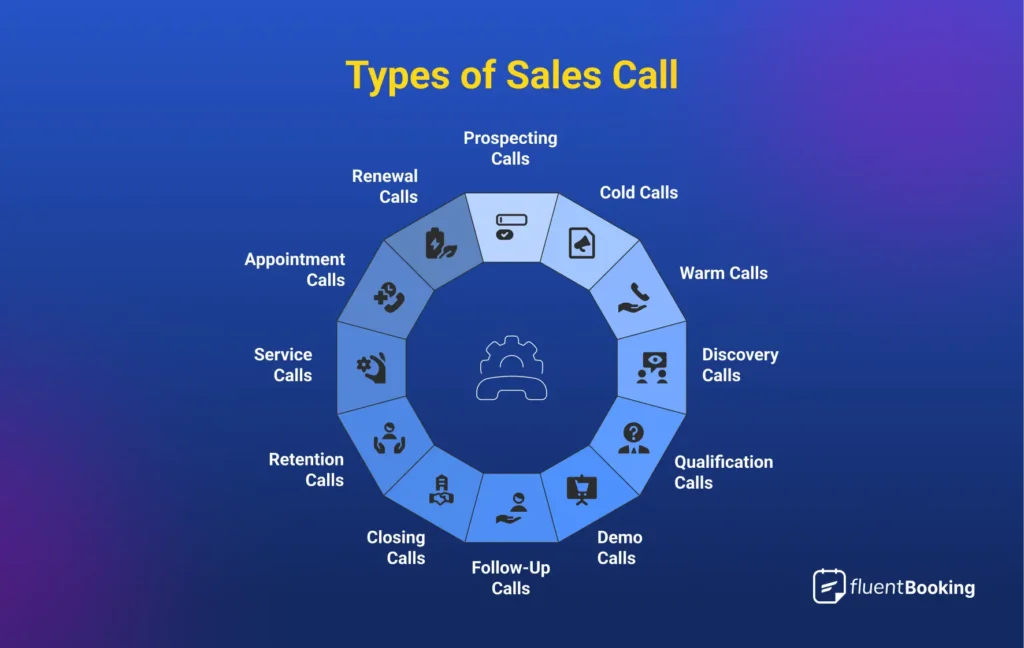
Cold Call
A cold call is the first contact between a salesperson and a potential customer who has never interacted with the business before. It’s an unsolicited outreach meant to introduce your product or service and spark interest.
Think of it as knocking on a stranger’s door; your goal isn’t to sell immediately, but to start a meaningful conversation.
Why Cold Calling is Important?
Cold calls might seem old-school, but they’re still one of the most effective ways to create new opportunities. Here’s why they matter:
- Expand your reach: Cold calls help you connect with potential customers who haven’t yet discovered your business or offerings.
- Discover new markets: You can uncover untapped segments or industries that may not respond to digital ads or inbound campaigns.
- Build real connections: Direct conversations allow you to understand prospects’ needs firsthand, paving the way for trust and future relationships.
- Gather market insights: Every “no” gives you valuable feedback about pricing, messaging, or objections data that can sharpen your overall sales strategy.
Example:
“Hi, Laura. This is Sam from BrightFlow. I work with marketing teams like yours to simplify project tracking. I know I caught you out of the blue, but do you have a quick minute to hear how we’ve helped similar teams save 5 hours a week?”
Best For
- Businesses entering a new market or territory.
- Startups building brand recognition from scratch.
- Sales teams are doing outbound prospecting or lead generation.
- Professionals selling high-ticket or B2B products that require conversation and trust.
Warm Calls
A warm call is made to someone who already knows about your business, they’ve engaged with your content, signed up for a resource, or previously interacted with your brand. Unlike cold calls, you’re continuing an existing connection rather than introducing yourself from scratch.
Why Warm Calling is Important?
Warm calls are powerful because they build on prior engagement, making it easier to move prospects closer to a sale. Here’s why they’re essential:
- Nurture interest: You’re reaching out to people who have already shown curiosity about your products or services.
- Increase conversion chances: Familiarity with your brand makes prospects more open and receptive.
- Strengthen relationships: Personalized follow-ups show that you’re attentive and care about their needs.
- Higher receptiveness: Prospects who’ve already engaged with your content are more open to conversation and feedback.
- Save time and resources: You’re focusing on qualified leads instead of casting a wide net, making your sales efforts more efficient.
Example:
“Hi Alex, this is Mia from CloudBridge. I noticed you downloaded our free workflow automation guide last week. How’s it helping you so far? I’d love to share a few tips on how other teams are saving hours each week using it.”
Best For
- Following up with marketing-qualified leads
- Engaging prospects from webinars, email campaigns, or content downloads
- Nurturing relationships with semi-interested buyers
- Teams aiming to improve lead conversion without starting from scratch
Prospecting Calls
Prospecting calls are early-stage sales calls focused on identifying potential customers and determining if they’re a good fit. Unlike cold or warm calls, the goal here isn’t to sell immediately but to qualify leads and gather key information.
Why Prospecting Calls are Important?
Prospecting calls are essential for building an efficient sales pipeline. They help you:
- Expand your reach: Connect with people who haven’t heard of your company yet, opening doors to new opportunities.
- Uncover untapped markets: Identify leads and industries that haven’t been explored by your sales team.
- Start relationships on the right foot: Personalized, one-on-one conversations help establish trust early.
- Save time and resources: Avoid wasting effort on unqualified leads by filtering them out early.
- Qualify leads early: Ensure you focus your efforts on prospects with genuine potential.
- Collect insights to improve strategy: Every call reveals information about challenges, priorities, and decision-making processes that you can use to refine your approach.
Example:
“Hi, Sophia. I’m Daniel from LeadPeak. We help small marketing teams automate client reporting. I’m curious, who on your team handles analytics reporting right now?”
Best For
- Sales reps building a qualified lead list
- Businesses running outbound campaigns
- Teams looking to target prospects with real buying potential
- Companies seeking to shorten the sales cycle by focusing on high-quality leads
Discovery Calls
A discovery call is a more in-depth conversation with a prospect to gain a deeper understanding of their challenges, goals, and needs. Unlike prospecting calls, which focus on qualification, discovery calls aim to uncover insights that enable you to tailor your solution effectively.
Why Discovery Calls are Important?
Discovery calls are vital because they set the foundation for successful sales. Here’s why they matter:
- Understand customer needs: By listening carefully and asking the right questions, you gain insight into the prospect’s specific pain points and goals.
- Build trust and rapport: Genuine conversations show that you care about their success, which strengthens the relationship.
- Increase your chances of closing: Tailoring your solution to the customer’s situation makes your pitch more relevant and compelling.
- Guide the sales process: Discovery calls provide the information needed to create demos, proposals, and next steps that align with the prospect’s priorities.
Example:
“Thanks for joining the call today, Jordan. Before I show you how our platform works, can you walk me through the biggest challenges your team faces with workflow management?”
Best For
- Businesses with consultative or high-touch sales models
- Service-based or B2B companies offering tailored solutions
- Moving qualified leads further down the sales funnel
- Teams aiming to create more personalized, effective pitches
Qualification Calls
A qualification call helps determine whether a potential lead is the right fit for your product or service. It’s all about assessing their needs, budget, authority, and timeline before investing more time in the sales process.
Why Qualification Calls Are Important?
Qualification calls are crucial because they help you focus your efforts on leads that are most likely to convert. Here’s why they matter:
- Save time and resources: By identifying unqualified leads early, you prevent your sales team from chasing dead ends.
- Focus on high-potential leads: Qualification helps prioritize prospects who truly need your solution and have the capacity to buy.
- Boost conversion rates: Engaging with leads who already fit your ideal customer profile increases the likelihood of meaningful conversations and successful conversions.
- Personalize future interactions: Understanding a lead’s goals, pain points, and buying readiness allows you to tailor your follow-ups and demos more effectively.
- Improve sales efficiency: A well-structured qualification process keeps your pipeline clean and boosts overall conversion rates.
Example:
“Before we dive into details, I’d love to understand what your current setup looks like and what goals you’re trying to achieve. That’ll help me see if we’re a good fit for your needs.”
Best For
- Filtering leads before scheduling demos or proposals
- SaaS or service-based businesses with multi-step sales funnels
- Sales teams looking to streamline prospecting and improve close rates
- Building a qualified, high-value sales pipeline
Demo or Presentation Calls
A demo or presentation call is where you showcase your product or service to a potential customer, highlighting how it solves their specific challenges. It’s a crucial step in the sales process to transform your earlier discovery insights into a tailored, value-driven presentation that resonates with the prospect’s goals.
Why Are Demo or Presentation Calls Important?
Demo or presentation calls are where your solution truly comes to life. They give prospects a hands-on look at how your product or service can solve their specific challenges and deliver real value.
- Showcase real value: Instead of just talking about features, demos let prospects see how your product works and how it can make their day-to-day easier or more efficient.
- Build confidence and trust: A well-executed demo demonstrates professionalism and understanding, helping prospects feel confident that your solution is the right choice.
- Address objections in real time: Live presentations provide an opportunity to answer questions, handle objections, and clarify how your product fits their unique needs.
- Move leads closer to a decision: Seeing the solution in action often turns curiosity into conviction, pushing prospects one step closer to closing the deal.
Example:
“Before we get started, I’d like to focus today’s demo on the features that can best support your team’s scheduling challenges. I’ll show you how our automation tools can save your team up to 10 hours per week—does that sound good?”
Best For
- Demonstrating how your solution directly solves a prospect’s problem
- Turning qualified leads into paying customers
- Building trust through transparency and personalization
- Shortening the sales cycle with hands-on product experience
Bonus: After delivering a great demo, don’t forget to keep your sales team sharp. Explore 15 Creative Sales Meeting Ideas and Topics to energize your next session.
Service Calls
A service call is made to assist existing customers with issues, questions, or requests related to your product or service. These calls are focused on providing support, solving problems, and ensuring customers get the best possible experience.
Why Are Service Calls Important?
Service calls are crucial for maintaining customer satisfaction and brand reputation. They go beyond fixing issues, like showing that your business genuinely cares about customer success. Here’s why they matter:
- Enhance customer experience: Prompt, effective support builds confidence and keeps customers happy.
- Prevent churn: Addressing concerns early helps retain customers who might otherwise switch to a competitor.
- Gather valuable feedback: Service interactions often reveal product gaps or improvement opportunities.
- Strengthen trust and loyalty: Customers who receive great service are more likely to become long-term advocates.
Example:
“Hi Emma, I noticed your team faced some issues integrating the plugin last week. I just wanted to check in and make sure everything’s running smoothly now. Do you need any further assistance?”
Best For
- Providing proactive or reactive customer support
- Improving satisfaction and retention rates
- Identifying upsell or renewal opportunities through great service
- Strengthening brand loyalty through consistent care
Follow-Up Calls
A follow-up call is a post-interaction conversation where sales professionals reconnect with prospects after a previous meeting, demo, or initial discussion. The goal is to maintain momentum, address unanswered questions, and gently guide the prospect toward a decision. AI SDR can support this stage by automating timely follow-ups, prioritizing the most engaged prospects, and ensuring no warm lead slips through the cracks.
Why Are Follow-Up Calls Important?
Follow-up calls are vital for nurturing relationships and keeping your brand top of mind. Many deals aren’t closed in the first call, so consistent follow-up often makes the difference between a missed opportunity and a successful sale. Here’s why they matter:
- Keep the conversation alive: A well-timed follow-up ensures your solution stays relevant and prevents leads from going cold.
- Clarify and reinforce value: You can revisit key points from earlier discussions, provide additional details, or share tailored resources to strengthen your value proposition.
- Show professionalism and commitment: Following up demonstrates that you care about the prospect’s needs and are invested in helping them succeed.
- Increase close rates: Persistent, thoughtful follow-ups can help overcome hesitation and turn interest into a final “yes.”
Example:
“Hi Alex, I wanted to quickly follow up on our demo from last week. You mentioned needing to streamline your client scheduling. Did you get a chance to review the automation features we discussed?”
Best For
- Re-engaging leads after a demo, proposal, or discovery call
- Addressing pending questions or objections
- Building trust and maintaining consistent communication
- Converting warm prospects into paying customers
Closing Calls
A closing call is the final step in the sales process, where you confirm the prospect’s decision to purchase and finalize the deal. It’s not just about signing contracts; it’s about addressing any last-minute concerns, reaffirming value, and ensuring both sides are aligned before moving forward.
Why Are Closing Calls Important?
Closing calls are the most critical stage of any sales journey. This is where all your previous efforts, prospecting, discovery, and demo, come together to secure a commitment. Here’s why they’re essential:
- Seal the deal with confidence: A well-handled closing call gives prospects the clarity and reassurance they need to make their final decision.
- Overcome last-minute objections: You can address lingering doubts, clarify pricing or terms, and guide the conversation toward a confident “yes.”
- Strengthen long-term relationships: A professional, pressure-free close sets the tone for a positive partnership beyond the sale.
- Increase win rates: Effective closing calls ensure that warm leads don’t slip away due to hesitation or miscommunication.
Example:
“I’m glad to hear the demo addressed your main concerns, Jamie. If everything looks good, we can finalize the onboarding today so your team can start using the platform right away. Does that timeline work for you?”
Best For
- Finalizing deals and securing customer commitment
- Addressing final objections or contract details
- Creating a smooth handoff to onboarding or customer success teams
- Building lasting client relationships that lead to renewals and referrals
Bonus: Want to turn your next closing call into a done deal? Check out our detailed guide on sales meetings to learn how to structure conversations, handle objections, and confidently close more sales.
Retention or Post-Sale Calls
A retention or post-sale call takes place after a customer has made a purchase. The goal is to ensure they’re satisfied, help them get the most value from your product or service, and build a relationship that leads to long-term loyalty.
Why Are Post-Sale Calls Important?
These calls are crucial for maintaining customer satisfaction and turning one-time buyers into repeat customers or brand advocates. Here’s why they matter:
- Strengthen customer relationships: Checking in after the sale shows genuine care and commitment to the customer’s success.
- Ensure product satisfaction: Addressing early questions or challenges helps customers see results faster and prevents churn.
- Identify upsell or cross-sell opportunities: By understanding how customers use your product, you can suggest additional features or upgrades that add even more value.
- Boost customer retention: Happy customers are more likely to renew, refer others, and stay loyal to your brand over time.
Example:
“Hi Sarah, I just wanted to check in and see how your team is settling in with the new platform. Have you had a chance to explore the automation features we discussed during the demo?”
Best For
- Strengthening long-term relationships after purchase
- Reducing churn and improving customer satisfaction
- Identifying growth opportunities through feedback and upsells
- Turning customers into loyal advocates for your brand
Renewal Calls
A renewal call is made to existing customers whose subscription, contract, or service term is nearing its end. The goal is to discuss renewal options, reaffirm value, and ensure the customer continues benefiting from your product or service.
Why Are Renewal Calls Important?
- Retain valuable customers: Proactively reaching out before renewal dates helps prevent churn and ensures a smooth continuation of service.
- Reinforce product value: Use the opportunity to highlight results, new features, or improvements since the last purchase.
- Discover upsell opportunities: Renewal discussions often open the door for upgrades or expanded plans.
- Build long-term relationships: Staying engaged beyond the initial sale shows an ongoing commitment to customer success.
Example:
“Hi Olivia, your annual plan is set to renew next month. I wanted to check in to see how everything’s been going and share a few new features that might add even more value to your team.”
Best For
- Retaining existing customers and reducing churn
- Encouraging upgrades or plan renewals
- Strengthening trust through proactive communication
- Maintaining steady recurring revenue streams
Sales Appointment Calls
A sales appointment call is used to schedule or confirm a meeting with a potential client, either for a demo, consultation, or negotiation. It’s the bridge between initial outreach and deeper engagement, setting the stage for meaningful conversations.
Why Are Sales Appointment Calls Important?
These calls help ensure both parties are aligned and prepared for the next step in the sales process. Here’s why they’re important
- Secure valuable time with decision-makers: Setting an appointment ensures you get undivided attention from key prospects.
- Increase meeting attendance: A confirmation call reduces no-shows and ensures the prospect is ready and informed.
- Build professionalism and trust: A polite, organized scheduling approach sets a positive first impression.
- Keep your sales pipeline moving: Appointment calls maintain momentum and prevent leads from going cold.
Example:
“Hi James, I wanted to schedule a quick 20-minute call this Thursday to show how our booking system could simplify your team’s scheduling workflow—does that time work for you?”
Best For
- Scheduling discovery, demo, or negotiation meetings
- Keeping leads engaged and moving forward
- Improving meeting attendance rates
- Ensuring a smooth, organized sales process
with Automated Scheduling
Structured appointments help you focus on the conversation, not the logistics. FluentBooking automates scheduling so you never miss a meeting.
How to Make Any Sales Call Successful
No matter the type of sales call, these tips can help you get the best results:
- Do Your Research: Know your prospect’s business, challenges, and recent activity before dialing.
- Personalize Every Call: Use the prospect’s name, mention past interactions, and address their specific needs.
- Mind Your Tone: Be professional but friendly; smiling while talking makes your voice more engaging.
- Time It Right: Call when your prospect is most likely available — avoid early mornings, late evenings, or busy hours.
- Use Open-Ended Questions: Encourage prospects to share challenges and goals, e.g., “What’s your biggest challenge with…?”
- Listen More Than You Talk: Understand your prospect’s needs before pitching; respond thoughtfully.
- End with a Clear Next Step: Always conclude with an action like scheduling a demo, sending a proposal, or following up.
- Leverage Tools: Use solutions like FluentBooking to automate scheduling and reminders, keeping follow-ups consistent.
Master Every Sales Call and Close Smarter
Sales calls aren’t one-size-fits-all. From cold calls to renewals, each type serves a unique purpose in moving prospects through your sales pipeline.
Understanding when and how to use each call not only improves your conversion rates but also builds stronger relationships with your customers.
Start practicing the right type of call at the right time, track your progress, and refine your approach. With the right preparation and organization, every call can bring you closer to your next big win.
Ratul Ripon
I enjoy making complex ideas simple and engaging through my writing and designs. With a strong knowledge on content writing and SEO, I create technical content that’s both easy to understand and interesting.
Table of Content
Subscribe To Get
WordPress Guides, Tips, and Tutorials






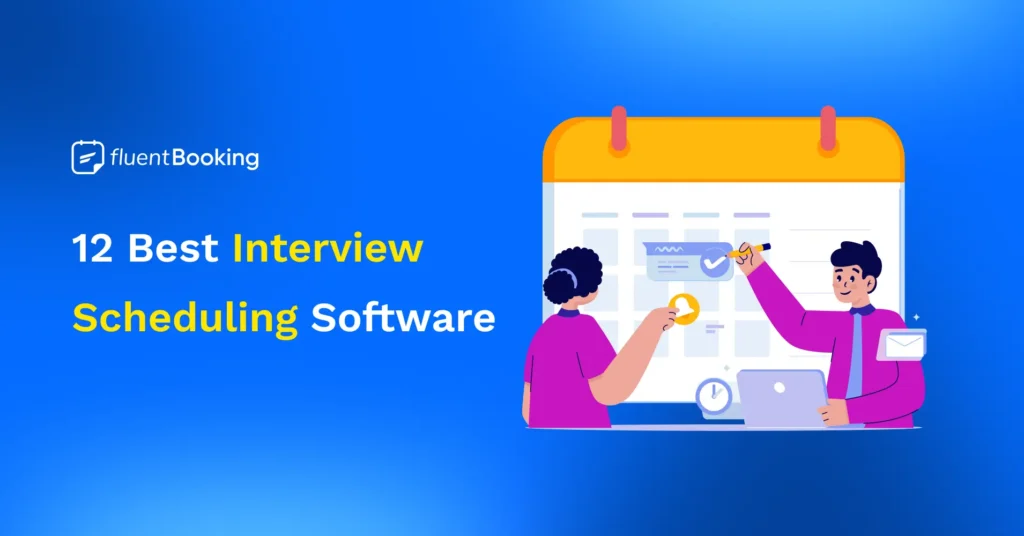
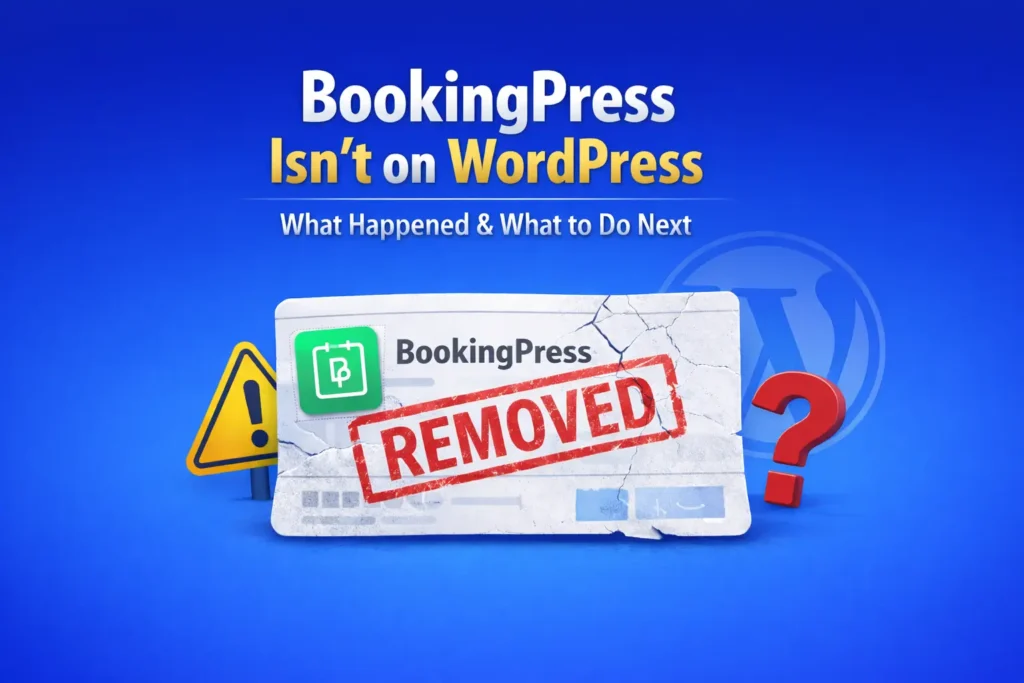
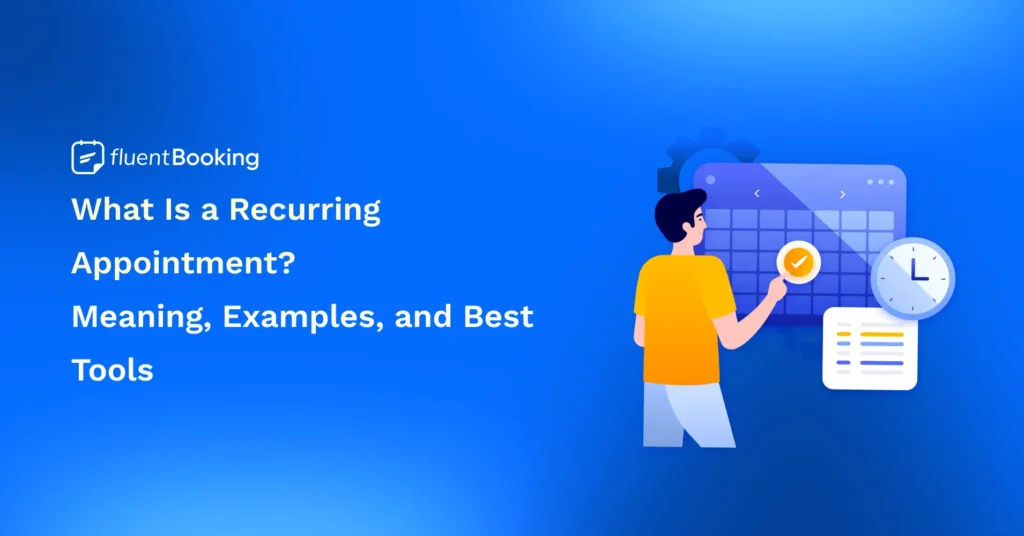


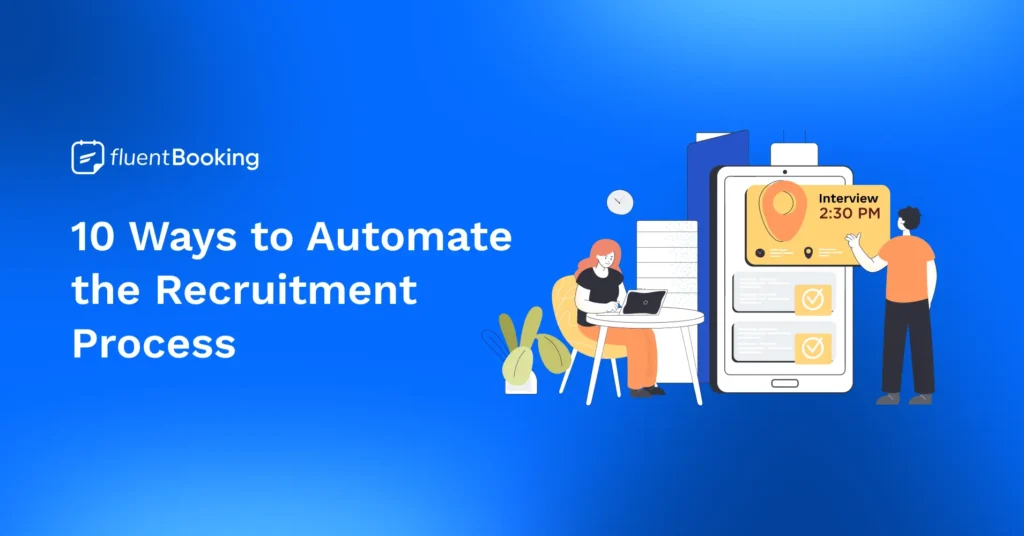
Leave a Reply